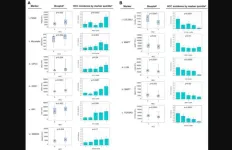Scientists find new way to roll atomically thin nanosheets into scrolls
Janus nanosheets bring unprecedented control to preparation of nanoscrolls
2024-02-10
(Press-News.org)
Tokyo, Japan – Researchers from Tokyo Metropolitan University have come up with a new way of rolling atomically thin sheets of atoms into “nanoscrolls.” Their unique approach uses transition metal dichalcogenide sheets with a different composition on either side, realizing a tight roll that gives scrolls down to five nanometers in diameter at the center and micrometers in length. Control over nanostructure in these scrolls promises new developments in catalysis and photovoltaic devices.
Nanotechnology is giving us new tools to control the structure of materials at the nanoscale, promising a whole nano-toolset for engineers to create next generation materials and devices. At the forefront of this movement, a team led by Associate Professor Yasumitsu Miyata of Tokyo Metropolitan University have been studying ways to control the structure of transition metal dichalcogenides (TMDC), a class of compounds with a wide range of interesting properties, such as flexibility, superconductivity, and unique optical absorbance.
In their latest work, they set their sights on new ways of making nanoscrolls, nanosheets rolled up into tight scroll-like structures. This is an attractive approach for making multi-walled structures: since the structure of each sheet is the same, the orientations of individual layers are aligned with each other. However, the two existing ways of making nanoscrolls have significant issues. In one, removing sulfur atoms from the surface of the nanosheet creates distortions which cause the sheet to roll up; but by doing so, they destroy the crystal structure of the sheet. In the other, a solvent is introduced between the nanosheet and the substrate, loosening the sheet from the base and allowing the formation of defect-free nanoscrolls. However, tubular structures made like this tend to have large diameters.
Instead of approaches like this, the team have come up with a new way of causing sheets to roll up. Starting with a monolayer molybdenum selenide nanosheet, they treated the nanosheet with a plasma and replaced the selenium atoms on one side with sulfur; such structures are called Janus nanosheets, after the ancient two-faced god. Gentle addition of a solvent then loosens the sheets from the base, which then spontaneously roll into scrolls due to the asymmetry between the sides. These new nanoscrolls are multiple microns in length, significantly longer than previously made single-walled TMDC nanosheets. Furthermore, they were found to be more tightly rolled than ever before, with a center down to five nanometers in diameter, meeting theoretical expectations. The scrolls were also found to interact strongly with polarized light and have hydrogen producing properties.
With unprecedented control over nanostructure, the team’s new method forms the foundation for studying new applications of TMDC nanoscrolls to catalysis and photovoltaic devices.
END
[Attachments] See images for this press release:

ELSE PRESS RELEASES FROM THIS DATE:
2024-02-10
New test for improving population-based colorectal cancer screening
A new stool test appears to detect colorectal cancer precursors better than the current test. This could further reduce the number of new colorectal cancer cases as well as the number of people dying from the disease. A study led by the Netherlands Cancer Institute compared both tests. The results are published today in The Lancet Oncology.
Each year worldwide, approximately 1.9 million people are diagnosed with colorectal cancer, and 935,000 people ...
2024-02-09
People who quit smoking see major gains in life expectancy after just a few years, according to a new study by University of Toronto researchers at Unity Health Toronto.
The study, published in NEJM Evidence, shows that smokers who quit smoking before age 40 can expect to live almost as long as those who never smoked. Those who quit at any age return close to never-smoker survival 10 years after quitting, and about half that benefit occurs within just three years.
“Quitting smoking is ridiculously effective in reducing ...
2024-02-09
Researchers at the University of São Paulo’s Luiz de Queiroz College of Agriculture (ESALQ-USP) and the Federal University of Viçosa (UFV) in Brazil have shown for the first time that bixin or annatto powder, a carotenoid pigment extracted from the seeds of the achiote or annatto tree (Bixa orellana), is not produced only in the seeds but also in other organs, and that the process intensifies in the plant’s adult phase.
An article on the study published in the Journal of Experimental Botany, also describes genetic modifications in the species that can optimize production of the pigment, which is widely used in the food ...
2024-02-09
Humans are still evolving, and Tatum Simonson, PhD, founder and co-director of the Center for Physiological Genomics of Low Oxygen at University of California School of Medicine, plans to use evolution to improve healthcare for all.
Her latest research, which was published February 9, 2024 in Science Advances, reveals that a gene variant in some Andean people is associated with reduced red blood cell count at high altitude, enabling them to safely live high in the mountains in low-oxygen conditions. Simonson’s UC San Diego lab is applying those findings toward understanding whether there may be a genetic component ...
2024-02-09
Waltham — February 9, 2024 — For Black men with prostate cancer, racial representation is a key factor affecting trust in websites offering information on prostate cancer, reports a study in the March issue of The Journal of Urology®, an Official Journal of the American Urological Association (AUA). The journal is published in the Lippincott portfolio by Wolters Kluwer.
"Our study shows that representation matters to Black patients seeking prostate cancer information online," comments lead author Stacy Loeb, MD, MSc, PhD (Hon), of New York University Langone Health. "Not only does it impact trust in the information, but a lack ...
2024-02-09
From work to school to socializing, COVID-19 has impacted just about every part of our lives—and now Boston University research has shown that also includes what happens in the bedroom. A study of more than 2,000 cisgender women found the coronavirus disease can impair sexual function, with long COVID having an especially detrimental effect.
“If you’re sick with COVID, you’re probably less interested in sex and maybe your body is less prepared to have sex,” says Amelia M. Stanton, a BU College of Arts & Sciences assistant ...
2024-02-09
“A fundamental hypothesis we sought to test was whether biomarkers from the TGF-β signaling pathway might be of novel value in risk stratification of HCC in the clinical cirrhotic setting.”
BUFFALO, NY- February 9, 2024 – A new research paper was published in Genes & Cancer on February 5, 2023, entitled, “Mechanistically based blood proteomic markers in the TGF-β pathway stratify risk of hepatocellular cancer in patients with cirrhosis.”
Hepatocellular carcinoma (HCC) is the third leading cause of death from cancer worldwide but is often diagnosed at an advanced incurable stage. Yet, despite the urgent need for ...
2024-02-09
There may, as they say, be plenty of fish in the sea — but angling opportunities on Utah’s streams, rivers and lakes are getting more crowded.
The number of anglers trying their luck on Utah waters has consistently increased over the years, meanwhile it’s getting more expensive for state managers to raise and stock gamefish and increasingly difficult to access water-based recreation during the ongoing megadrought.
Managers of fisheries in the state are being asked to do more with less these days, and they’re working more strategically to create sustainable opportunities for everyone picking up a rod and ...
2024-02-09
Research Highlights:
In the EMBOLISE clinical trial, obstructing (or blocking) an artery that supplies blood to the dura, the protective covering of the brain, along with surgery to remove pooled blood reduced the chances by nearly 3-fold that blood would reaccumulate and require additional surgery. According to researchers, complications related to the embolization procedure were low, and neurological function was comparable to those without embolization.
Chronic subdural hematoma, a pooling of blood between the brain and one of its outer coverings, is one ...
2024-02-09
Waltham — February 8, 2024 — For patients undergoing total hip arthroplasty (THA), the use of robotic-assisted surgery and surgical navigation techniques is not associated with an increased risk of periprosthetic joint infection (PJI), suggests a study in The Journal of Bone & Joint Surgery. The journal is published in the Lippincott portfolio by Wolters Kluwer.
Computer navigation (CN) and robotic assistance (RA) do not alter the risk of PJI after total hip replacement surgery, according to the new research by Alberto V. Carli, MD, and colleagues of Hospital for Special Surgery, New York.
Could CN and RA increase risks during hip replacement?
Computer ...
LAST 30 PRESS RELEASES:
[Press-News.org] Scientists find new way to roll atomically thin nanosheets into scrolls
Janus nanosheets bring unprecedented control to preparation of nanoscrolls





